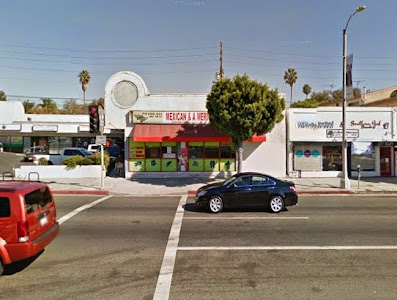 |
| An artist who dubbed himself "El Warpo" illustrated Ed Wood's story "Superfruit" in 1971. |
NOTE: This article is part of my ongoing coverage of Blood Splatters Quickly: The Collected Stories of Edward D. Wood, Jr.
 |
| 5585 W. Pico Boulevard today - a strip mall. |
Although Libra may seem to be a new or different company, it shares an address (5585* W. Pico Boulevard) with all the other Calga/Pendulum/Gallery magazines put out by Bernie Bloom.
*some magazines say 5583.
Synposis: Freelance writer Rance Hillborn is confined to his Los Angeles penthouse during an uncharacteristically lengthy rainy spell. But he has enough food, cigarettes, and booze to tide him over for days. He receives a call from a distraught friend, Lawrence, and invites him over.
*some magazines say 5583.
Synposis: Freelance writer Rance Hillborn is confined to his Los Angeles penthouse during an uncharacteristically lengthy rainy spell. But he has enough food, cigarettes, and booze to tide him over for days. He receives a call from a distraught friend, Lawrence, and invites him over.
Once at Rance's place, Lawrence begins to ruminate about his problems. He's distraught over the very recent death of his lover, William, and his half-million-dollar fruit business is in the doldrums. Lawrence thinks that Rance, being a professional writer, might give him some guidance. Rance tells him that the truly successful professionals are those with specialties. Lawrence should gear his advertising to homosexuals: selling fruit to the fruits. "The whole population," says Rance, "will know you as the SUPER FRUIT."
Wood trademarks:
Wood trademarks:
- alcohol (whiskey sodas mainly, but also gin and vodka)
- homosexuality
- character named Rance (cf. this collection's "Epitaph for the Village Drunk")
- expression "for love nor money" (cf. For Love and Money)
- reference to freeway accident rates (cf. Night of the Ghouls)
- looking down on vehicles and speculating about the lives of the drivers (cf. Glen or Glenda:"All those cars, all going someplace" speech)
- the life of a successful writer (cf. Orgy of the Dead)
- disparaging reference to marijuana (it's "no fun" and brings on "law problems")
- completely gratuitous reference to women's boots and how they complement the female form
- fur fetish (in this case, a white nylon fur-covered chair)
- fixation on death ("How many winters and summers do we have?")
- dialogue "I've got a problem." "Haven't we all?" (taken verbatim from Glen or Glenda)
- speculation about the word "conventional" (cf. Necromania)
- going to a friend for help with a personal problem (cf. Glen or Glenda, Drop Out Wife)
Excerpt:"The whole point is that you haven't tried everything. You've stayed conventional. Conventional ads. Conventional business practices. Conventional this and conventional that. To hell with conventions. That's why my books are not conventional. They have a lot of startling happenings which drag my readers in by the score and the publishers are begging for the next sheet as it comes out of my typewriter."
 |
| Editorial page from Luscious. |
Because of his work for Bernie Bloom's Pendulum Press and its many, many subsidiaries, Eddie had to write a lot of stories about homosexual characters. Sometimes, these were for straight publications (Gold Diggers); other times, they were for gay titles (Male Lovers).
Luscious seems to be a straight magazine, since its inaugural cover featured a "young lady" who "could cause an unwary male a lot of heartache." Its focus seems to be on the erotic possibilities of food, with particular emphasis on fruits and vegetables. Its contents page describes it as being "dedicated to all that is especially delicious, particularly edible."
I can imagine Bernie telling Eddie, "Give me something about sex and food, maybe fruits." Ed Wood's response was to write a story which essentially hinges on a pun: the double meaning of the word "fruit." This makes it a first cousin to "Missionary (Position) Impossible," whose entire reason for being was a play on the double meaning of the word "queen." At least here, Wood does not make the two main characters into swishy stereotypes, the way he did with the "white queen" from "Missionary." I wonder, though, why Eddie felt it necessary to give Rance a "Princess phone" rather than some other kind.
But even though this story could be interpreted as another extremely convoluted setup to a silly punchline, there is something personal and humane about Eddie's writing in "Superfruit." Once again, as in "The Autograph," he has written a story about gay people coming out of hiding and being honest and open about their sexuality. "What do you have to hide from?" Rance tells Lawrence.
But even though this story could be interpreted as another extremely convoluted setup to a silly punchline, there is something personal and humane about Eddie's writing in "Superfruit." Once again, as in "The Autograph," he has written a story about gay people coming out of hiding and being honest and open about their sexuality. "What do you have to hide from?" Rance tells Lawrence.
Beyond that, it seems obvious to me that Ed Wood envies the cozy life of gay writer Rance Hillborn, whose very surname seems to suggest privilege and superiority. "His freezer," Ed writes, "was well stocked, his cigarette box was full and the wet bar was housed by a goodly collection of gins, whiskies, vodka and the other drinks his guests preferred."
And if that's not enough, Rance seems to be all set, career-wise: "Work, however, was no problem for Rance Hillborn. He was a freelance writer and he worked out of his apartment and when finished there was the apartment mail drop and the postman could brave all kinds of weather from there on in." I'm sure there were many times when Ed would have gladly switched places with Rance, "fruit" or not.
Next: "Flowers for Flame LeMarr" (1973)
Next: "Flowers for Flame LeMarr" (1973)

No comments:
Post a Comment